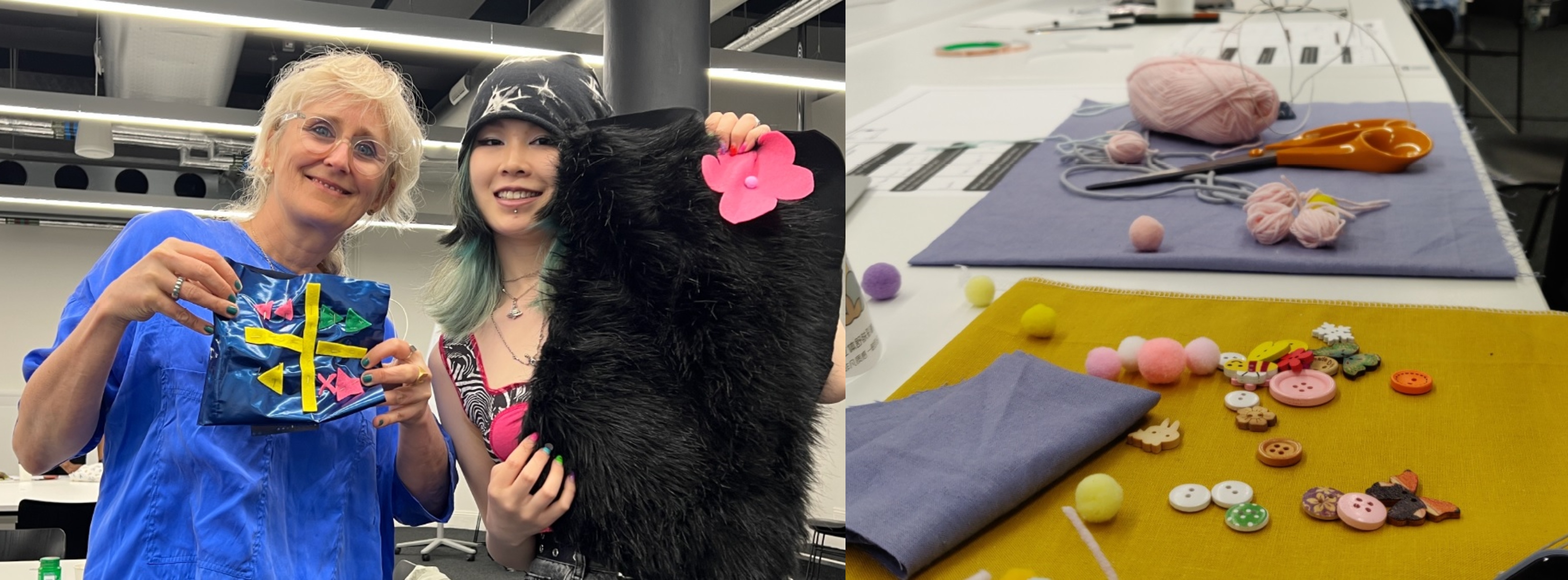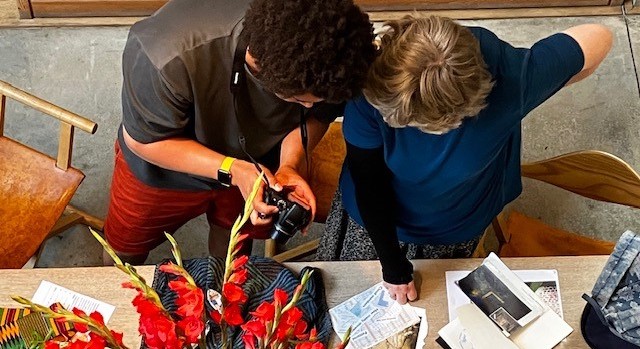Introducing the recipients of the Participatory Research Seed Fund. We’re thrilled to be supporting a wide range of activities, find out about the different projects below with more to be announced soon.
Smart pillows - led by Rebecca Stewart

Squeeze a pillow to pause Netflix? Brush your hand across the same pillow to turn up the volume? Smart textiles can let us interact with our computers and devices without needing to use a touch screen.
In the summer of 2022, two participatory workshops were held with members of the public who designed and made their own ‘smart pillows’. The first was held as part of EMF Camp, a multi-day camping festival in the Malverns centred around technology and art. The second was held in the Dyson Building on the South Kensington Campus of Imperial College London.
In both workshops participants were invited to design and build a ‘smart pillow’ which could take any form they would like. They then learnt how to program the electronics within the pillow so that surface of the pillow became touch sensitive and would trigger keyboard presses on their laptop connected to the pillow via USB lead.
Through this project a new hardware platform was developed and documented online, which was then tested with members of the public. Initial research findings from the pilot study workshops show that paper worksheets can assist novice smart textile designers with structuring their concepts, but more work is needed into communicating the core circuitry requirements. Participants showed great creativity with some design features that even surprised the researchers which highlighted why bespoke interfaces can be of value for personal interactive objects to be used in the home.
Rebecca is preparing a EPSRC New Investigator Grant application around the design and use of ‘smart’ soft furnishings in the home. The research workshops run with this funding will be used as pilot data to support the application. The hardware platform developed with this funding has been used in further research projects, most notably in a collaborative project with Prof Berit Greinke who is a visiting professor from University of the Arts (UdK) in Berlin. She is also planning to use the hardware in her teaching.
To find out more, please contact Rebecca Stewart (r.stewart@imperial.ac.uk)
My AI: An educational resource on data science and AI - led by Kelly Gleason
 Data science and artificial intelligence (AI) are changing healthcare for patients and for healthcare providers. We all need to better understand this field in order to help researchers develop apps, devices and other healthcare tools that people will want to use and will feel confident using.
Data science and artificial intelligence (AI) are changing healthcare for patients and for healthcare providers. We all need to better understand this field in order to help researchers develop apps, devices and other healthcare tools that people will want to use and will feel confident using.
Together a group of experts, patients and members of the public have been developing an education resource that will help anyone new to this field learn the basics around data science and artificial intelligence.
We want our resource to be accessible to all. We want people to be informed to help develop tools that we would all want to use. We do not want anyone to miss out on tools to support their health due to a lack of information. When a GP offers a patient with diabetes an app to support their blood sugar control, we want that person to be able to ask the right questions to feel confident using that app. When a researcher asks a group of patients about a new method of diagnosing cancer using AI, we want those patients to ensure that as a patient, their questions and concerns are incorporated in the research and the end product.
This project has been a true co-creation of a resource by the public for the public with the support of experts in the field.
To find out more, please contact Kelly Gleason (k.gleason@impeiral.ac.uk)
The IMPART Project (Imperial Monitoring using Passive samplers to Assess River Tributaries) - led by Stav Friedman and Alex Richardson
Chemical pollution in UK waterways is a growing concern for environmental and human health, but is seldom monitored or regulated. IMPART is a pilot project utilising citizen scientists and novel 3D-printed passive samplers to monitor rivers in Brent, Norwich and Sheffield in September of 2023. The aim of the project is two-fold: one, to develop a baseline of the chemical pollutants of concern in the identified UK rivers and two, to determine if the 3D-passive samplers are feasible for use by citizen scientists.
For the IMPART project, citizen scientists have been recruited from rowing and canoe clubs and will undergo a training session on chemical pollutants and sampling protocols in mid-September 2022. Using their knowledge and hands-on experience with their local river, they have identified 10 locations of interest where they will deploy the 3D-printed passive samplers for one week. Once collected, the samplers will be analysed by PhD candidate, Alex Richardson, in the Emerging Chemical Contaminants at Imperial’s Environmental Research Group White City lab. The results of the study will be shared with all the citizen scientists in a virtual seminar at the end of 2022, where we will invite other stakeholders of interest (NGOs, local councils, members of the public) to attend and learn about their local rivers. If successful, the project could act as the start of a river monitoring programme that could be rolled out UK-wide.
For more information on the IMPART project, please reach out to Project Manager Stav Friedman (s.friedman@imperial.ac.uk)